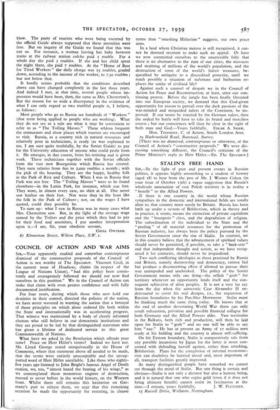STALIN'S FREE HAND
SIR,—In the light of past and present events in Russian politics, it appears highly astonishing to a student of history (aged 18) to hear from the pen of Mr. J. Werner Cohen (in your issue of October 13th) a vague suggestion that Russia's wholesale annexation of vast Polish territory is in reality a " benefit " to the Allied Powers.
t If there is one country in the world whom Russian sympathies in the domestic and international fields are totally alien to, that country must surely be Britain. Russia has been built up under a system of Bolshevism, which in theory and in practice, it seems, means the extinction of private capitalism and the " bourgeois " class, and the degradation of religion. The subordination of the individual to the State and the " pooling " of all material resources for the promotion of Russian industry, has always been the policy pursued by the Soviet Government since the rise of Stalin. In contrast, we in this country believe that the advancement of spiritual values should never be permitted, if possible, to take a " back-seat " and that independent thought and action, as we have recog- nised it for centuries, should never be jeopardised.
Two such conflicting ideologies as those practised by Russia and Britain, namely dictatorship and democracy, cannot fail but produce a disconcerting effect if allowed to pursue their way unimpeded and unchecked. The policy of the Soviet Government means only one thing—the selfish " grab " for territory whenever an opportunity lends itself and the con- sequent subjection of alien peoples. It is not a very far cry from the day when the autocratic Czar Alexander II en- deavoured to cover his real designs, i.e., the expansion of Russian boundaries by his Pan-Slav Movement. Stalin must be thinking much the same thing today. He knows that at the end of another devastating World War there can only result exhaustion, privation and possible financial collapse for both Germany and the Allied Powers alike. Vast territories in the Balkans, both rich and productive, will then be laid open for Stalin to " grab " and no one will be able to say him "nay." He has at present an Army of 17 million men ready at his bidding and the country is almost self-sufficing.
On his Eastern boundary, Stalin is comparatively safe from any possible incursions by Japan for the latter is more con- cerned with defending herself against, rather than attacking, Bolshevism. Plans for the completion of internal reconstruc- tion can doubtless be hurried ahead and, most important of all, transport facilities greatly improved.
As many distinguished people have remarked we cannot see through the mind of Stalin. But one thing is certain and obvious—Stalin is not only a dictator but also a human being, and it is natural that one who espies gold (even if it does not bring ultimate benefit) cannot resist its fascination at the
time.—I remain, yours faithfully, J. W. FLETCHER. 15 Russell Drive, Wollaton, Nottingham.








































 Previous page
Previous page